Defending the city of eternal fire through the eyes of the infantry: a report from the trenches near Avdiivka
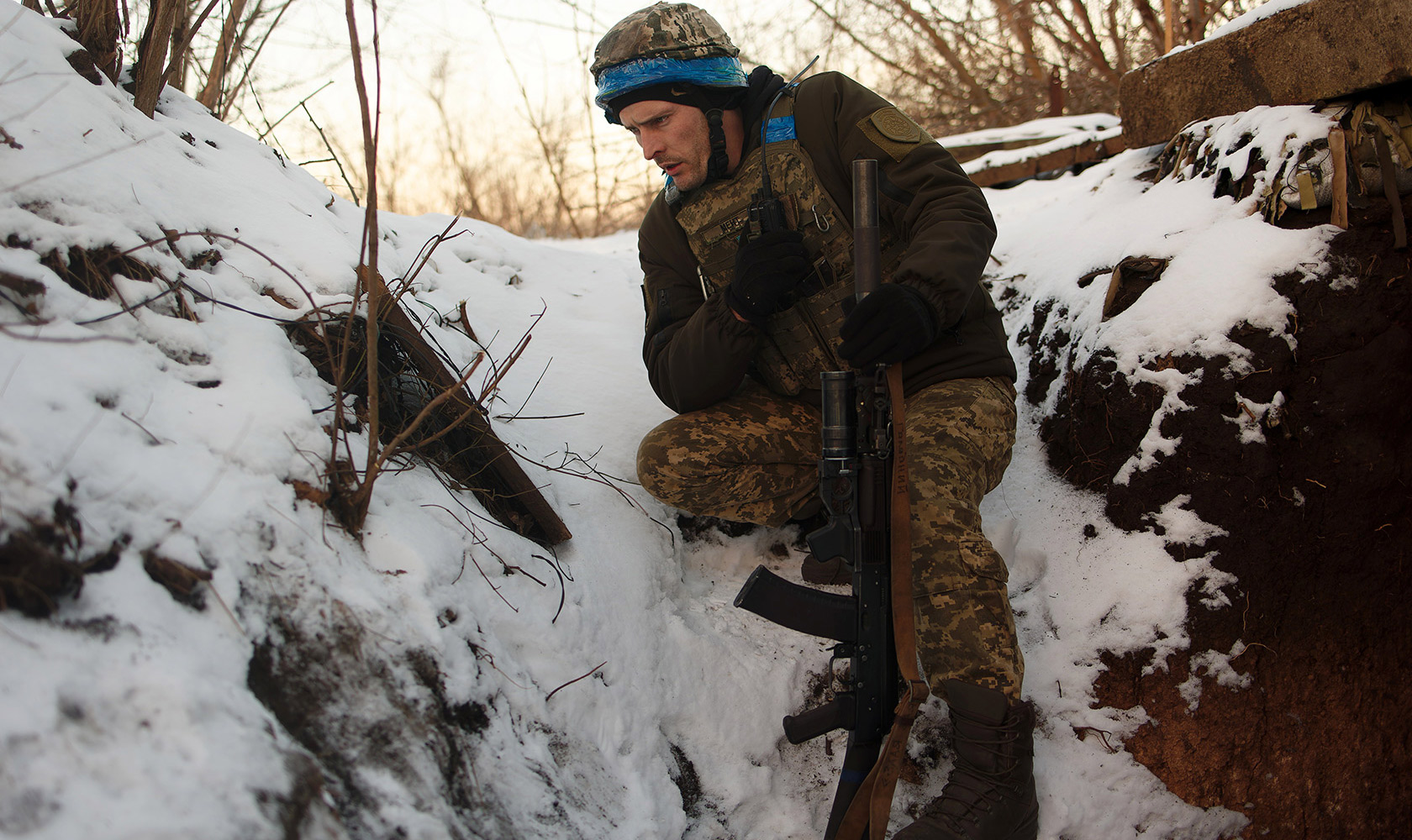
"Get down!"
A burst of machine-gun fire whistling over the bare bushes is interrupted by a shout from a combat medic named Petro. Five people – three soldiers and two Ukrainska Pravda journalists – fall to the snow.
Until Petro shouted, this sound – the sonorous rotating discharge of small arms ammunition – seemed distant and, as always, "not aimed at you". But not this time.
"Everyone good?" Petro asks after the first few seconds on the ground.
"Yes, roger," everyone there shouts as they exhale.
It is deep pre-morning darkness outside, and there is not a hint of a drone overhead. The only thing that glows is the round yellow moon and occupied Donetsk 10-15 km away on the horizon.
The soldier bringing up the rear in our small convoy gets up, runs forward and falls into the snow a couple of metres away.
Petro orders everyone to do the same: the last person in the "crawling convoy" stands up, quickly runs a few metres and falls down, waiting to be the last one again. And repeat in a loop. All this while wearing a bulletproof vest, a helmet and a backpack, and if you are a soldier, an AK over your shoulder.
Instead of the machine-gun sound, flashes on the horizon are visible – these are Ukrainian artillery units firing.
"Sh*t, sh*t," the press officer says, looking up at them.
The flashes later turn into the sounds of strikes, but fortunately, they are far away – not on us this time. But are they hitting our guys?
Petro warns us that we’ll have to jog the last few metres to our destination again, as the road ahead is under fire.
In civilian life, 200 metres is a couple of minutes’ walk on asphalt. In a war, it's 10-15 minutes, half of which you spend lying down with your cheek in the snow, catching your breath to cover another couple of metres. Just a couple of metres more.
That's how we reached the infantry positions of the 110th Separate Mechanised Brigade named after Marko Bezruchko near Avdiivka.
We spent a day with the 110th Brigade soldiers so we could report on the situation on this front and how the infantry works. We wanted to show readers something else too – how war shakes off the taint of the mundane and allows them to live life, even a few hundred metres away from the Russians.
Connections at the enlistment office, Avdiivka, and Roma’s Kalashnikov and grenade launcher
Achoo-achoo-achoo!
Serhii, a soldier in the 110th Brigade, sprays hand sanitiser into a metal cup and wipes it thoroughly with a paper towel. This is how he tries to protect himself, given that he shares the cup with his dugout neighbours – the mice.
It’s a few minutes before six, and Serhii is pouring boiling water into the cup he just wiped for his first morning coffee. The smell of instant Jacob’s, which in civilian life survives only in small-town markets, means one of the most pleasant things in wartime – morning has dawned.
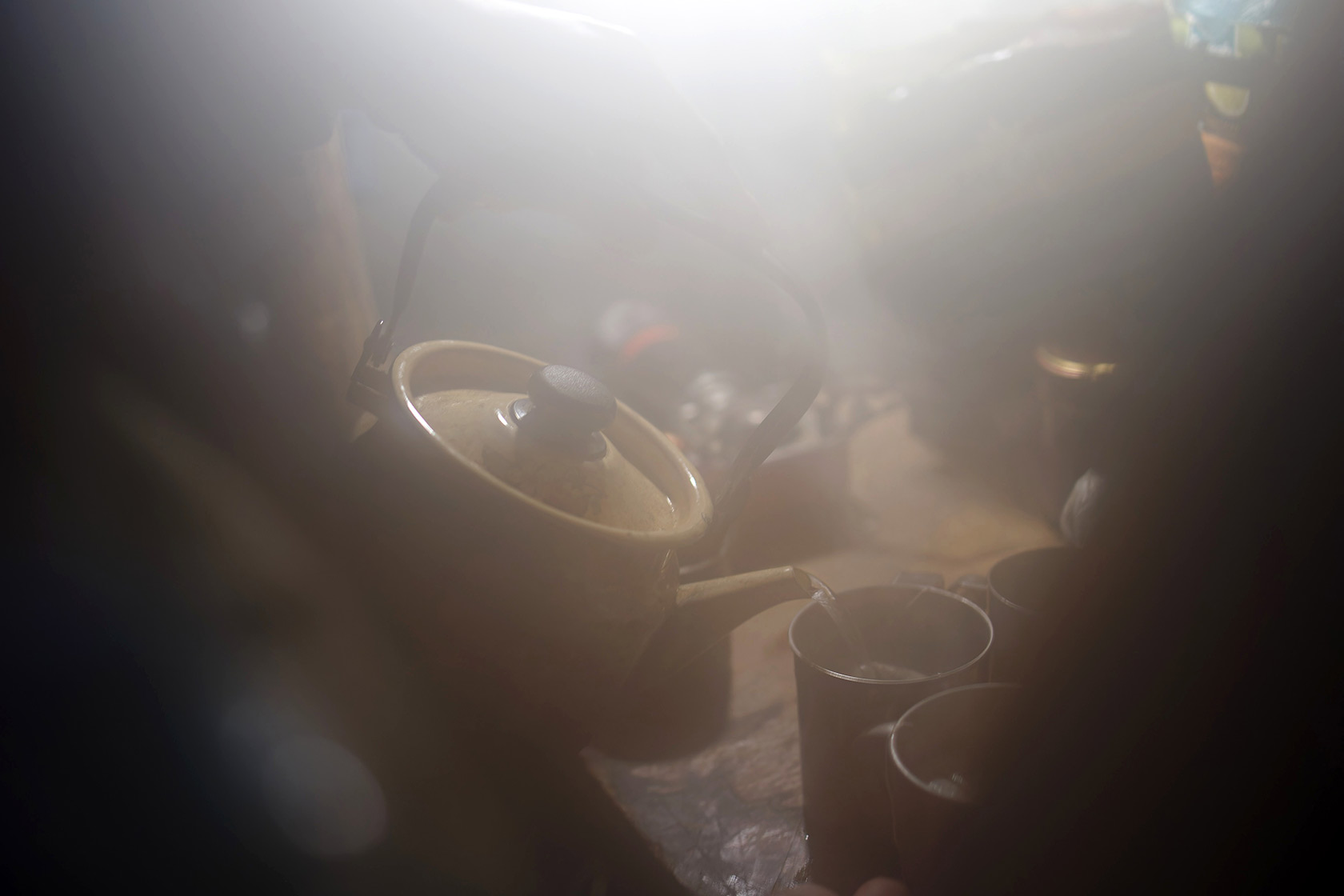
A former fighter in a special task force battalion and employee at Artemivsk prison, Serhii was a trucker and farmer until 24 February last year, and has spent a year at position N on the Avdiivka front.
After 24 February, Serhii had to use his old contacts from the military enlistment office – not to "dodge the draft" or get into an elite unit, but to convince his wife that his time to fight had come.
"I got back from a trip on 4 March, sat down and thought, I have to go and defend my land – I'm from Lyman! I went quietly to the enlistment office, where I knew some guys, and arranged for them to call me from an unknown number. On the day, they did so, and then I said to my wife, ‘That's it, darling, I gotta go to the enlistment office!’"
At the military enlistment office, Serhii was assigned to the newly formed 110th Brigade, the main unit defending the hard-hit Avdiivka, in Donetsk Oblast, since March 2022.
The coke plant city, which had survived eight years of the Anti-Terrorist Operation and Joint Forces Operation, became a city of fire in the first year of Russia’s full-scale invasion. [The Anti-Terrorist Operation, or ATO, is a term used from 2014 to 2018 by the media, the government of Ukraine and the OSCE to identify combat actions in parts of Donetsk and Luhansk oblasts against Russian military forces and pro-Russian separatists. In 2018, the ATO was renamed the Joint Forces Operation zone (JFO) – ed.] Every day Avdiivka is pummelled by Russian shells, rockets, and air-dropped bombs.
The Russian forces are attempting to encircle Avdiivka by assaulting it from several sides at once – similar to what they are trying to achieve in Bakhmut. According to information obtained by Ukrainska Pravda, since the beginning of 2023 Russian forces have been able to capture Opytne and Vodiane to the south of Avdiivka and broaden the scope of their assault operations to include Krasnohorivka and Vesele to its north.
Serhii says that where his unit is located on the Avdiivka front, they are up against fighters from the Donetsk People’s Republic [an illegal Russian-backed formation on the territory of Ukraine’s Donetsk Oblast – ed.], including the Somali Assault Battalion.
"They’ve recently had to shift a bit, because they couldn’t break through our positions. Now they’re assaulting the guys on the other side of Avdiivka. Though once they were able to slip by within a couple of kilometres of us…" Serhii recalls.
"Well, they’ve slipped in here a few times, even their infantry fighting vehicles," says Kolia, Serhii’s brother-in-arms, who’s been woken up by the sound of our voices resonating in the dugout.
"I used to think the guys were lying when they said [the Russians] were able to reach their positions – how could that be?" Serhii says, visibly annoyed. "But it turns out that some of them would get scared, retreat, and keep their mouths shut about it. So around six [Russians] took over their positions and hunkered down there. But we drove them out within maybe an hour."
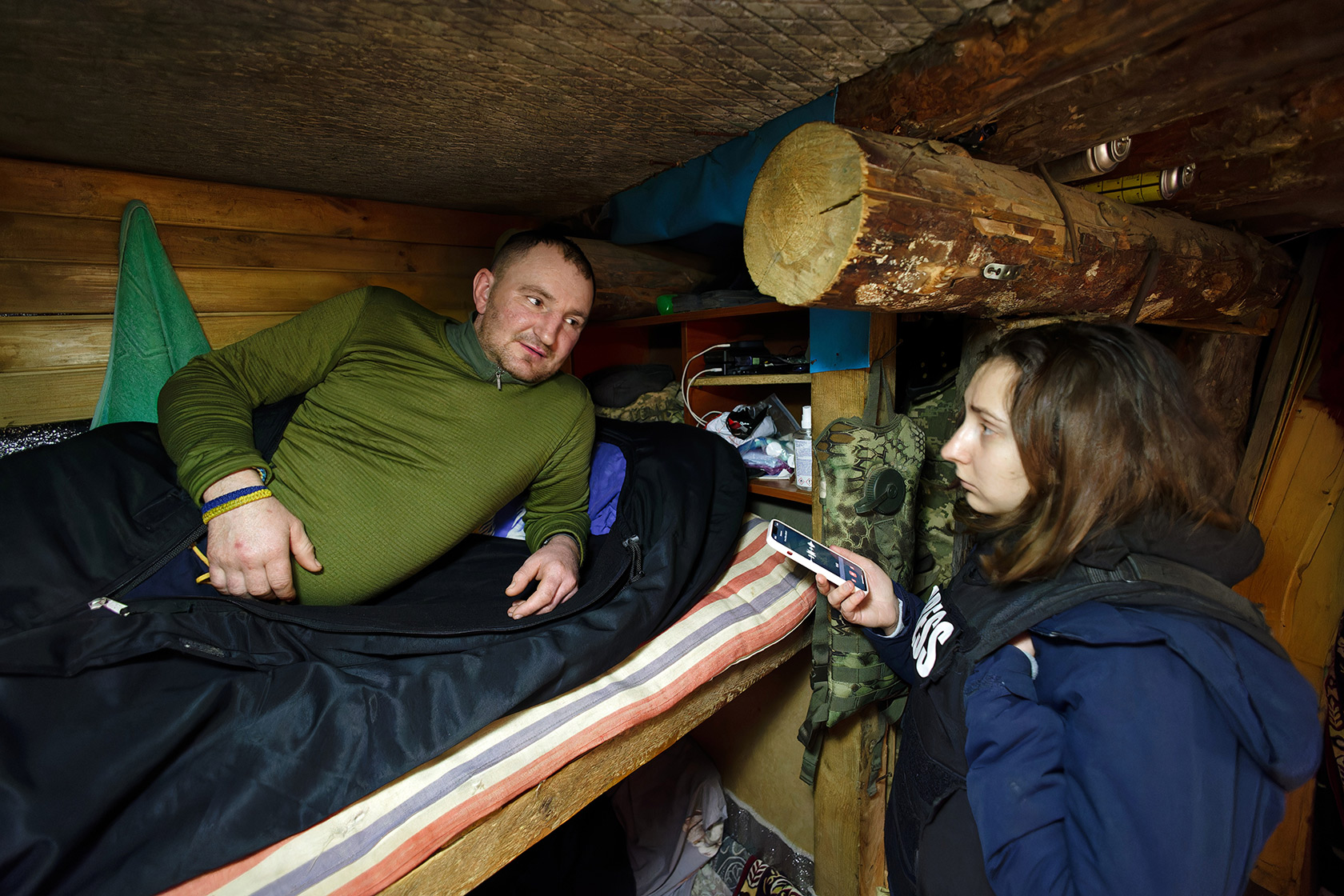
Serhii and Kolia were able to procure two machine guns and a rocket-propelled grenade during that "excursion". Several Russian soldiers were injured. Still, Serhii and Kolia consider the episode a failure, largely because they were unable to take any prisoners.
"Then we’d have someone to do the digging," Serhii jokes.
If the physical weight of words could be measured, the word "digging" – which for Ukrainian soldiers denotes work that’s physically gruelling and emotionally monotonous – would be as heavy as a tank.
Around 06:30, Serhii puts a kettle on to boil water for the second coffee of the morning and tells us that withdrawing from Avdiivka is not an option, however hard the Russians press in from the flanks. He says driving the Russians out would be impossible if they entrench.
"It’s similar to how Bakhmut is considered an elevation in relation to Sloviansk. If they capture Bakhmut, they will destroy everything within a 15-km radius, including in the direction of Sloviansk. Obviously our guys don’t want to withdraw because a lot of them have already been killed; to give up the fight now would leave them racked with guilt," Serhii explains.
Pointing to the Kalashnikov next to his makeshift bed, he adds, "This assault rifle belongs to Romka, my brother-in-arms who was killed. I carry it with me like a talisman. We were here together from the very first day. That’s how it is for the guys [in Bakhmut] too. There is definitely this sort of pride in our guys."
Serhii’s brother-in-arms Romka, or Roman, was killed last spring after an anti-tank guided missile hit his dugout. Two other soldiers were injured: one, whose lower jaw was severed, received a medical discharge; the other returned to the front.
Roman is survived by his wife and two children. Serhii keeps his Kalashnikov and grenade launcher.
Six litres of bohrach
At 06:45, Serhii says "Coffee without a cigarette is like tea that hasn’t been brewed," and steps outside with a metal mug in his hand. He squats, rests the mug on the back of a bike used for delivering gas bottles to his unit’s positions, and inhales deeply as he draws on his cigarette.
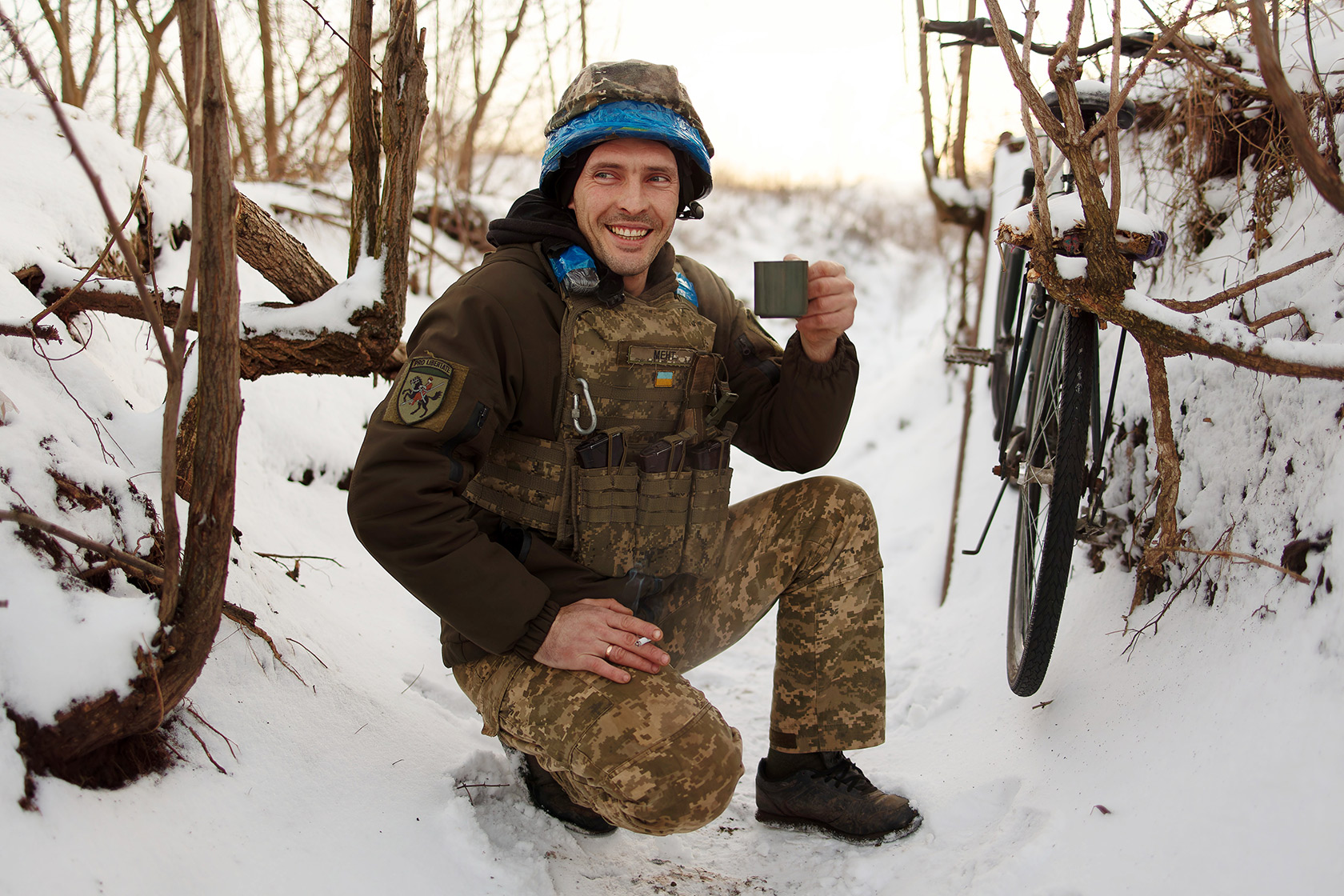
The dark sky has grown paler. Drones hover on either side of us, then we hear the sounds of artillery and aircraft. You have to be fast when you walk in the trench, keeping your distance from others and bending low, almost trotting.
"What do you usually think about when you drink your morning coffee?" we ask Serhii, quietly, to avoid making too much noise.
"My wife and children," he says. "I didn’t use to see them much, but recently I’ve decided that once the war is over I won’t be a trucker anymore. I used to own some land – I’ll get a bit more and work it."
In the spring of 2022, before his village near Lyman was occupied, Serhii managed to export and sell grain worth UAH 170,000 (approximately US$4,600). He spent most of the money on treats for his children and local food in Bukovel, in the Carpathians, during his recent leave.
Because for some things, you don’t have to wait for the war to be over.
"I didn't like banosh [corn porridge, a famous local dish], but bohrach [another Carpathian dish, similar to goulash, made of smoked ribs, beef, pork and salo]... I bought six litres of it! I thought I’d bring some here for the guys, but I ate it all in two days. My wife travelled around half of Poltava Oblast to find all the ingredients and cook some more," Serhii recalls.
The military unit had issued him a travel ticket that covered accommodation and food.
"Oh, here comes the master," says Serhii, nodding towards a black-and-white cat behind us who is unhurriedly approaching the trench. "Who’s here, Kuzia, strangers? Yeah, I see, come on, don't stay out in the cold."
And Kuzia decides not to freeze.
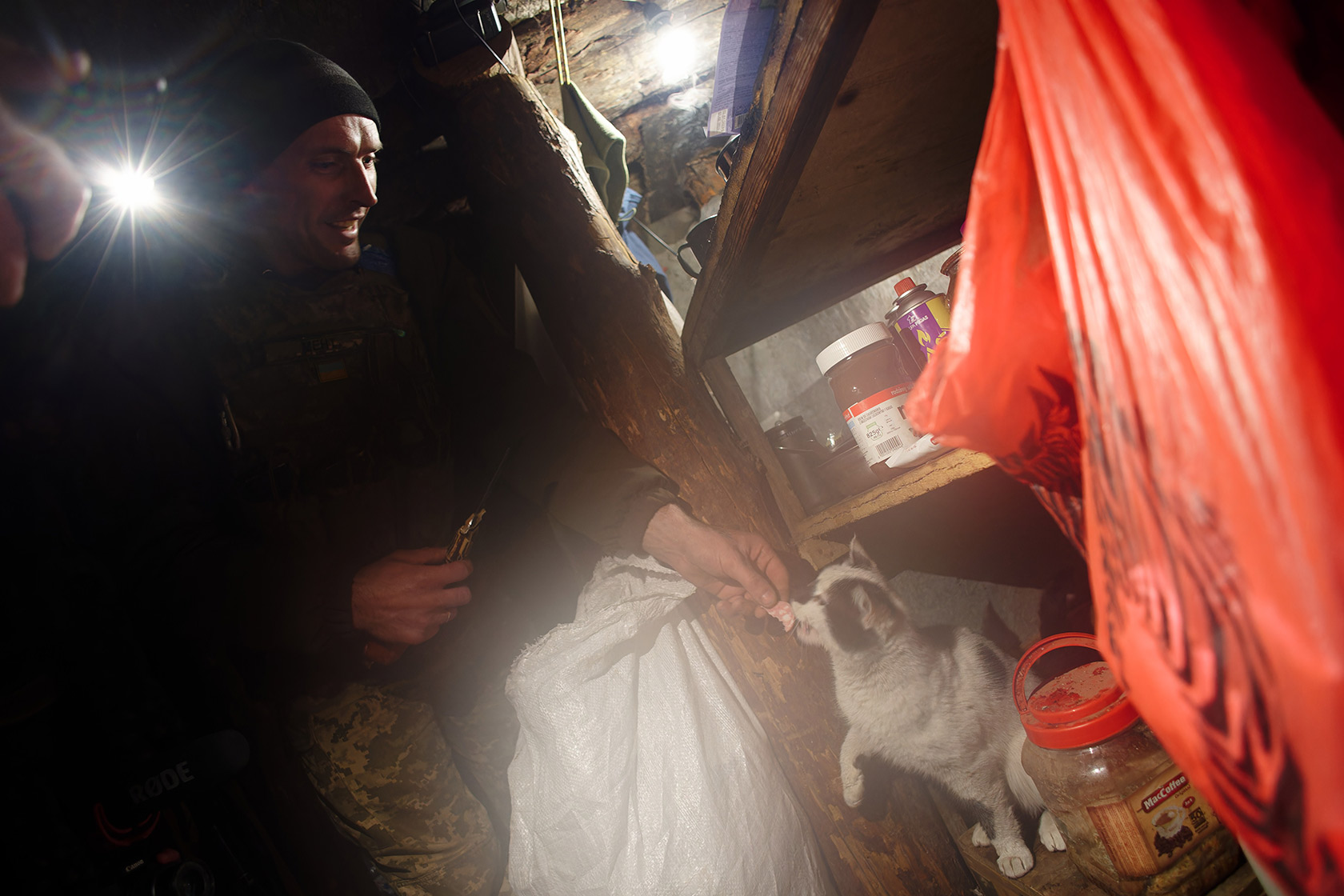
Air
At 08:59 a message comes over the walkie-talkie: "Attention, attention all positions. Air! Everyone to shelter!"
They have electricity over there
The main task of the infantry in this position is to observe. For however many hours the shift lasts, you keep looking ahead, and if the enemy appears – infantry, vehicles, or a drone in the air – you quickly report it to the commander.
If the enemy breaks through to a position, as in the story about Serhii and Kolia’s "excursion", it is essential to hold the defence.
"Every day they try to get past us somewhere, they test the ground. We’re never bored here," explains a serviceman named Dmytro who’s on duty at one of the observation posts that Serhii shows us.
"Afternoon," Petro, who accompanied us during the "morning run", greets him.
"How are you after our run?" we ask him.
"I'm fine, I just got back from leave," he answers, as if no shelling could overshadow the aftertaste of his leave.
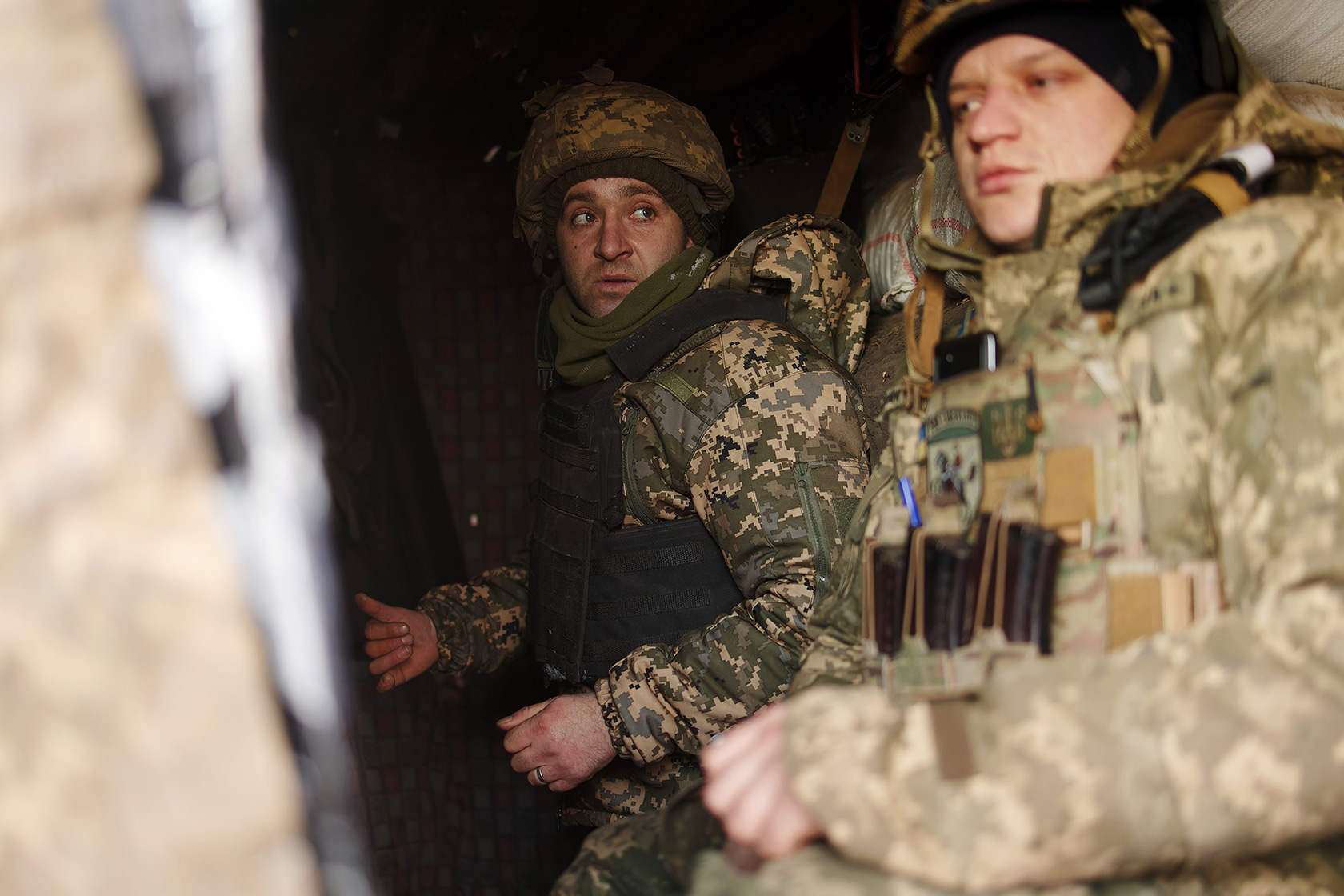
The word "leave" from the mouth of a Ukrainian soldier is the complete antonym of the word "digging". It smells of home, often of a girlfriend or wife, machine-washed bedlinen, cheesecakes, or coffee from a machine. The best word in the world.
"And how are you?" Petro asks us.
"I ought to run more," Ukrainska Pravda’s photographer concludes with a sigh.
"But the bullets still fly overhead," Petro continues.
"Yeah, I wouldn't run there, I'd just crawl there," the photographer adds, smiling.
"Before the war I hardly ever walked – I used to drive everywhere. If they’d built a drive-in for me to the toilet, I’d have gone there by car," Serhii joins in, laughing. "Just now I went to see my family when I was on leave – we’re walking around Poltava, and my wife says, ‘Where are you running to?’, and I say to her, "This is how I walk, darling – you don't walk slowly (in a war)."
For a few seconds, while the sun dazzles the horizon, Serhii climbs out of the trench and points with his left hand into the distance. We zoom in with a long lens and see several houses with intact roofs and walls. From this observation post you can clearly see the occupied settlement of M.
"It still lights up at night, they have electricity over there – and they say that the Armed Forces of Ukraine are destroying cities," Serhii says indignantly. "In Avdiivka, people are trying to survive as best as they can, damn it."
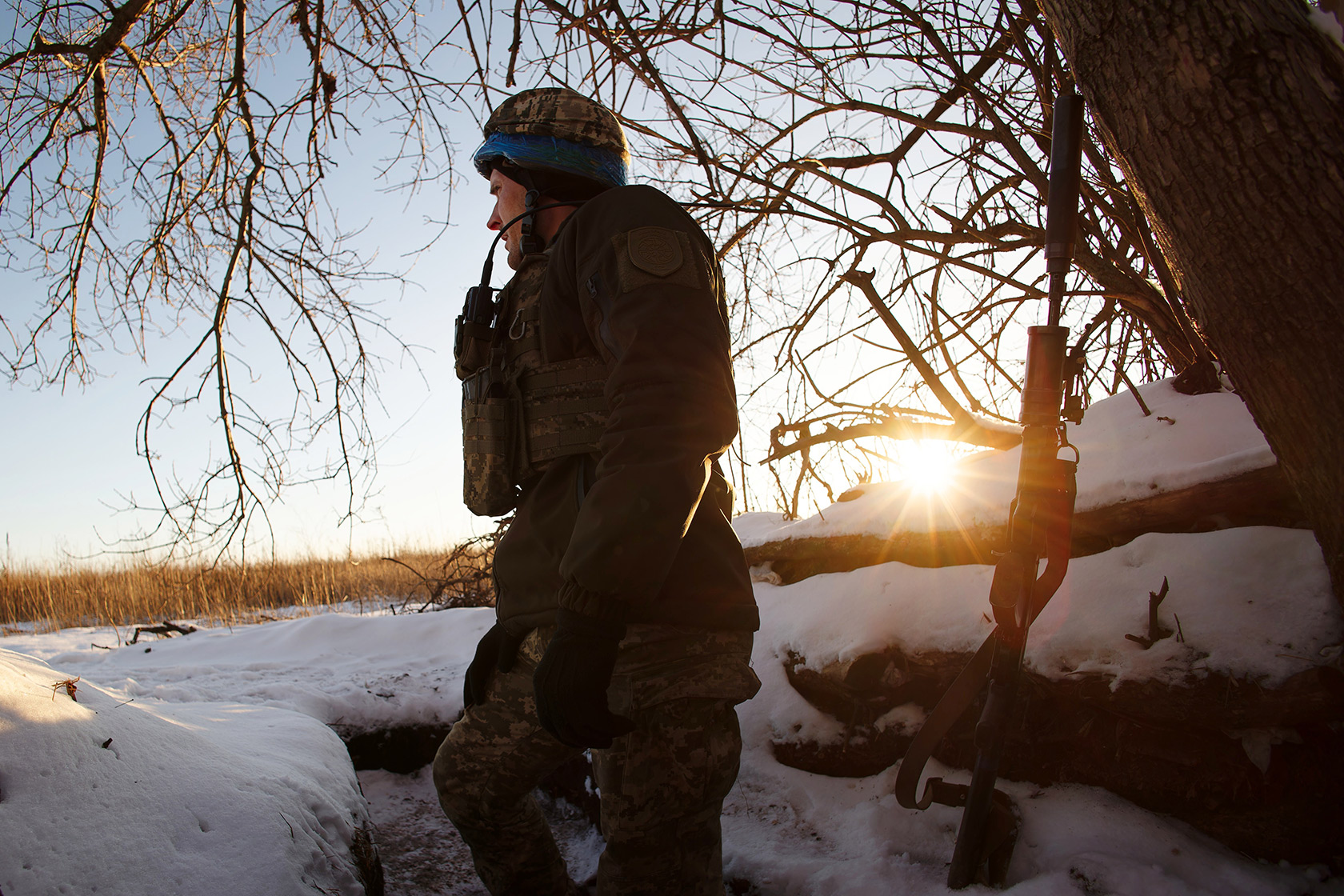
Bang
At 10:08, a message comes over the radio: "F**king helicopter, air-to-air". It’s followed by three dull explosions. Bang, bang, bang.
The icon
The person who gives out the most praise at the position is Petro. It doesn’t take much for him to do so: as long as the guys don’t get sick, and they carry the first-aid kits that Petro repacked for them when he joined the front line.
"Some of the first-aid kits were crammed so full that not even doctors in the civilian world would have kits like them. Kolia here even has two – one on him and one at ‘home’," Petro laughs in one of the dugouts, nodding towards Kolia, who has come to visit.
As evidence, Petro detaches Kolia's Combat Application Tourniquet from his body armour and says, "There you go!" And when asked what kind of tourniquets the guys used before, he answers with a sigh: "Chinese ones."
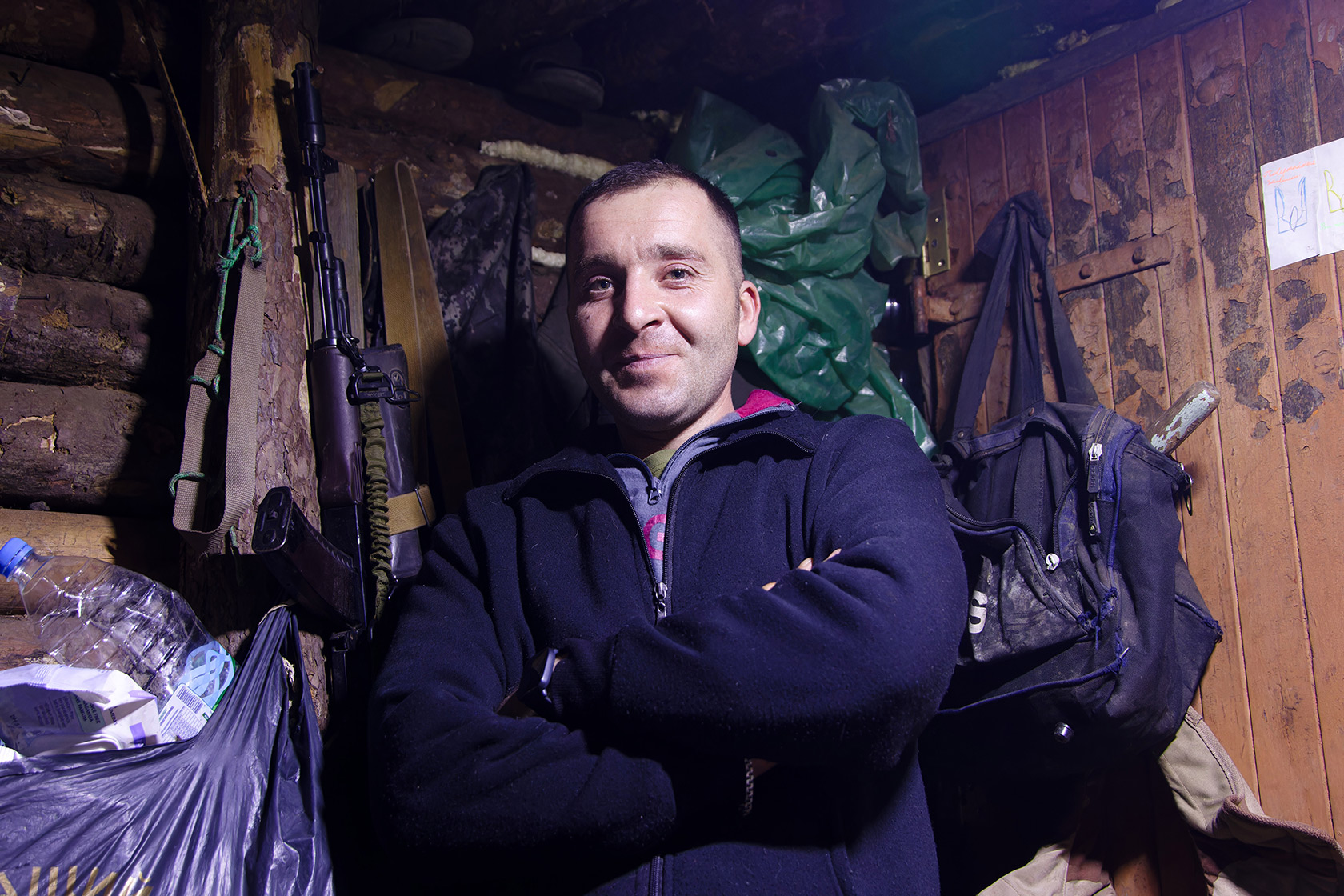
The only person who resists Petro's righteous teaching is a soldier named Vitalii. His main protection during the war is an icon of the Mother of God cradling a baby in her arms.
When we get to his observation post, we see that the icon is hanging right on the earthen wall of the trench.
"I came under an all-round mortar attack, but the icon was never hit!" Vitalii says, convinced of the effectiveness of his protection.
Meanwhile, the radio hanging near the icon tells us to keep our voices down.
"There’s usually a sniper operating here," Vitalii explains.
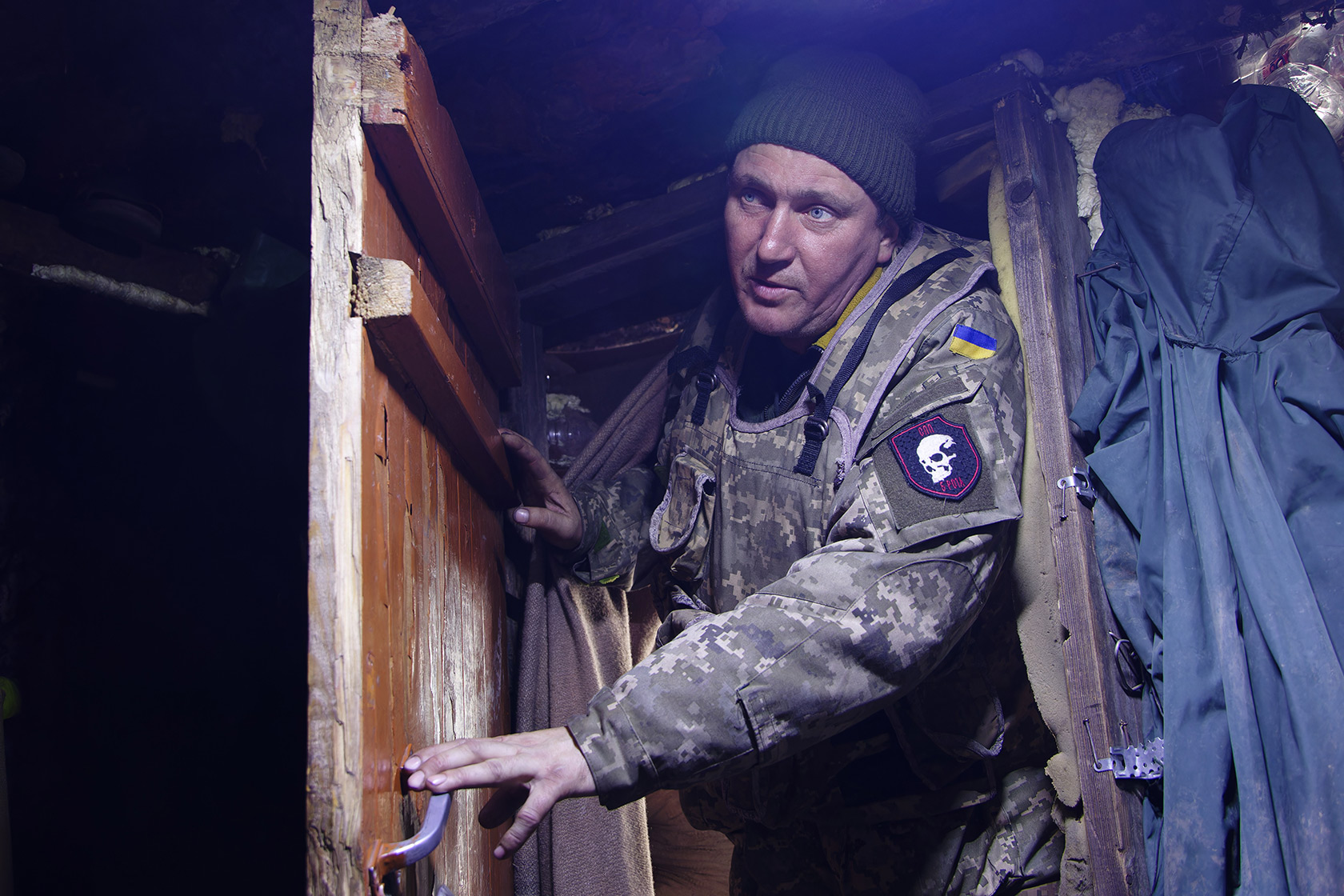
The only person Vitalii's icon did not protect (or did it?) was his brother-in-arms Ivan, a 6'6"-tall man in a white camouflage outfit who’s missing two fingers on his right hand. Rather than the Mother of God icon, it was Petro who evacuated him from the position.
"There was a strike 50 metres away, and I was hit," Ivan, who is now on duty, recalls calmly. "I got a penetrating liver and lung wound and a lung contusion. I spent six months recovering and then came back here. I belong here until the war is over."
On that same 24 February, Ivan was woken up by the bombardment of his backyard on the outskirts of Kharkiv. His six-year-old child was asleep on the other side of the wall. Ivan evacuated his family to the western Ukrainian city of Uzhhorod, then returned to the city being pounded by Russian rockets and went to the military enlistment office.
Ivan did this so that as few six-year-olds as possible would have to wake up like this.
Upon returning to the dugout, Vitalii asks his brothers-in-arms if there are any pineapples "at home" [in the dugout] and, popping open a tin of canned fruit, he gobbles them up with a fork.
A couple of minutes later, after finishing his shift, Ivan returns to the dugout. With his surviving left hand, he takes off his assault rifle, helmet, balaclava, body armour and white camouflage outfit. His right palm remains gloved.
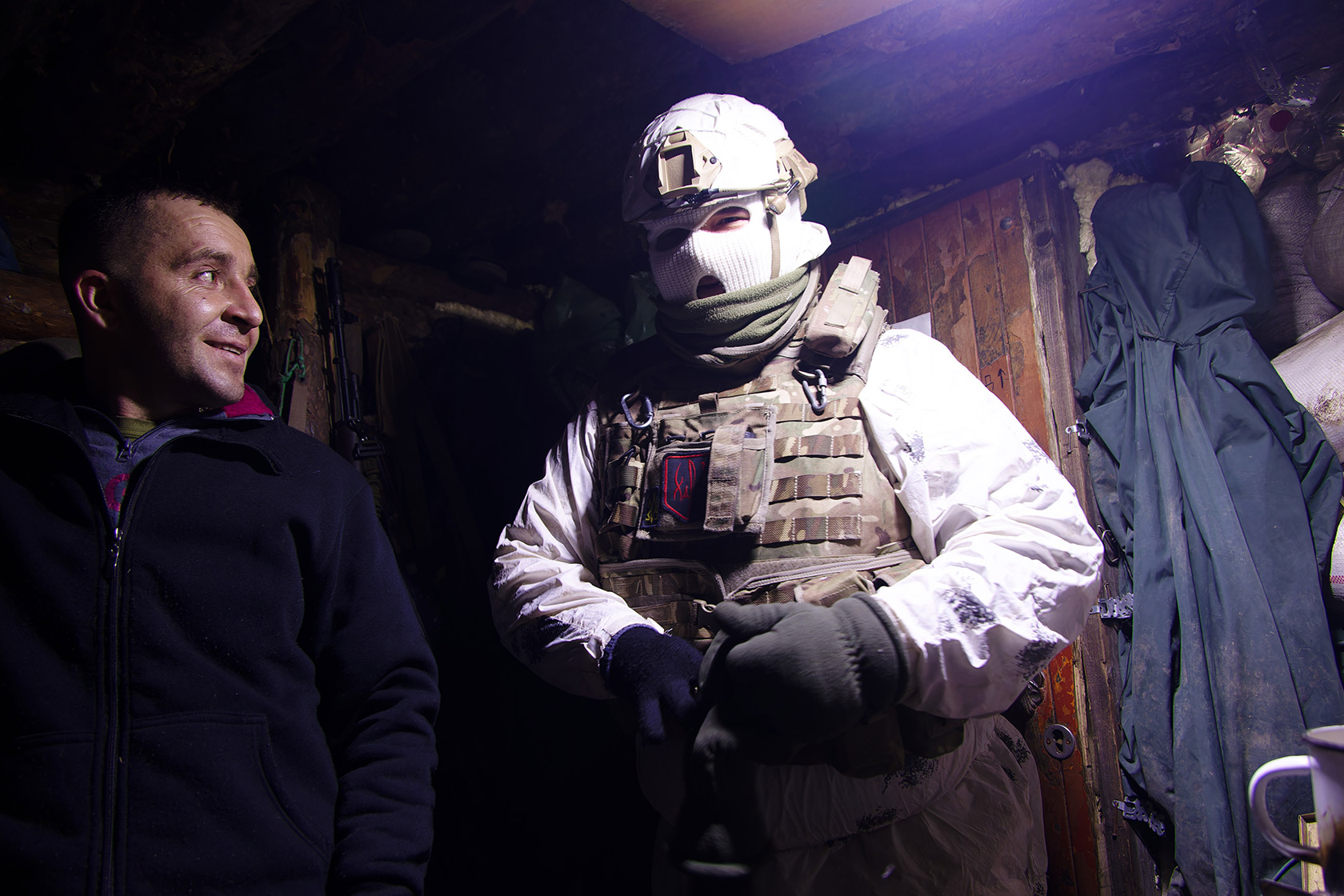
In the dugout, a kitten just a few months old is making tiny little noises. Unlike Kuzia, this one is an indoor kitten – its furry paws never leave the bunker.
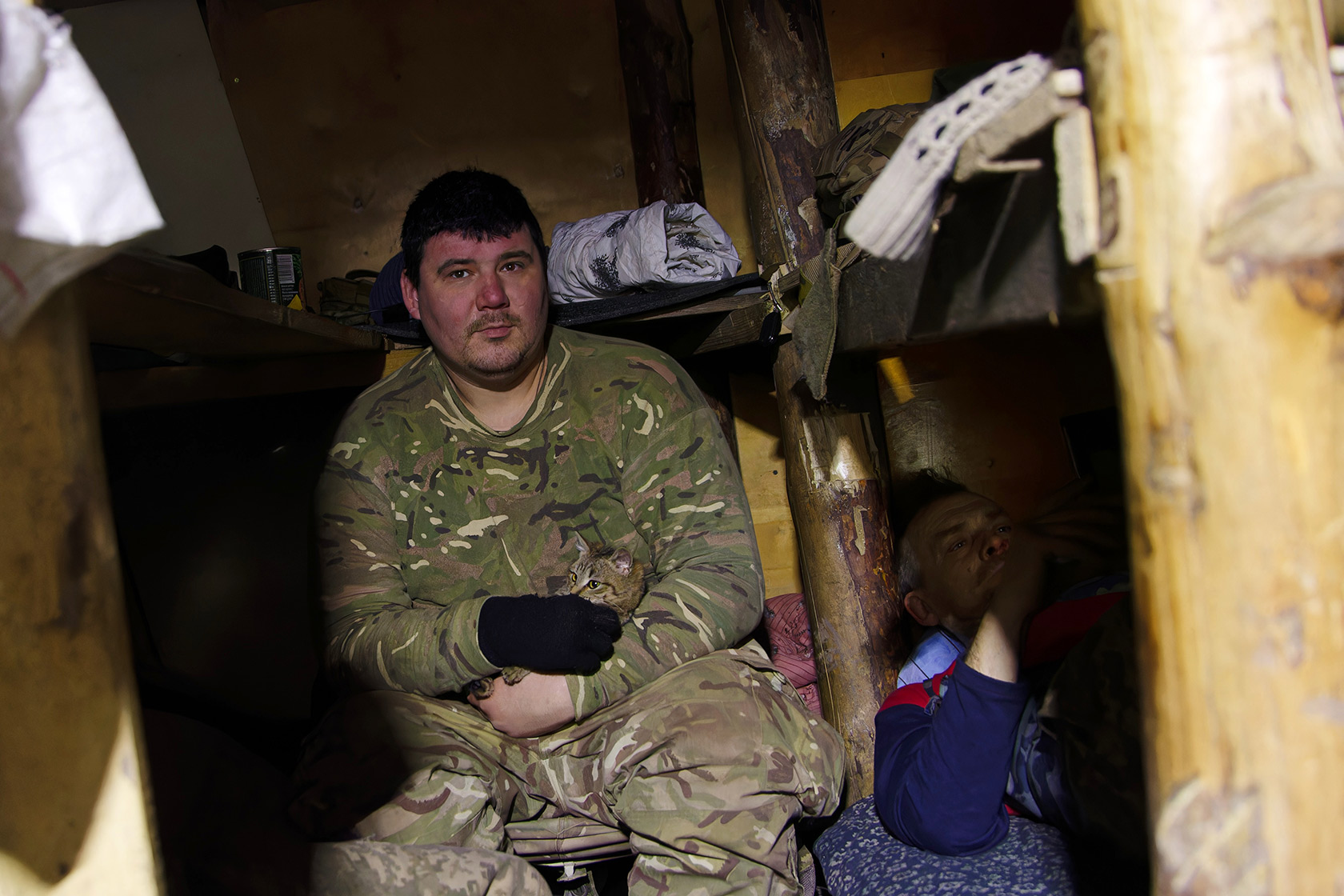
The birds
The observation post is an oasis of peaceful life at this position. Here the soldiers feed a few dozen great tits.
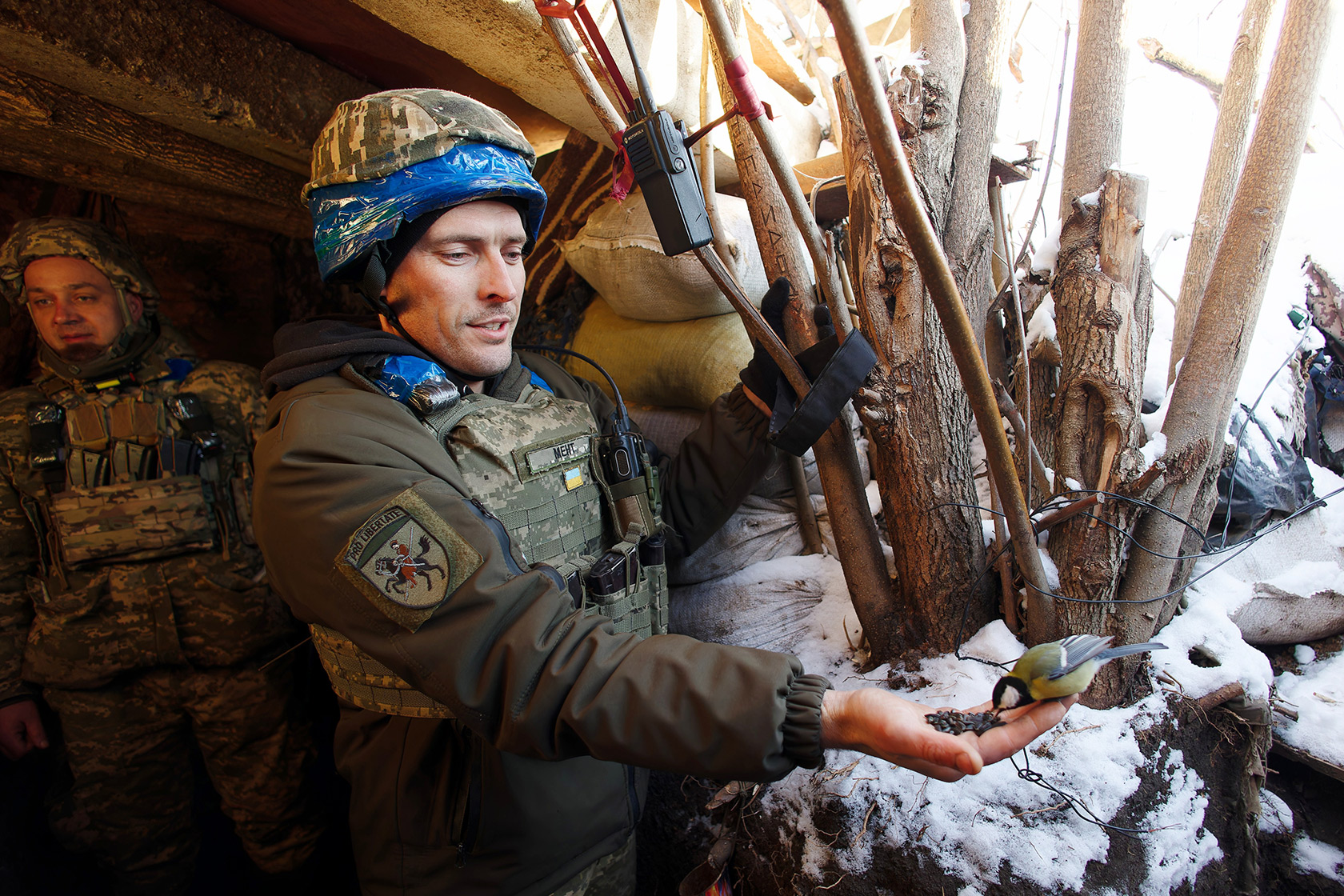
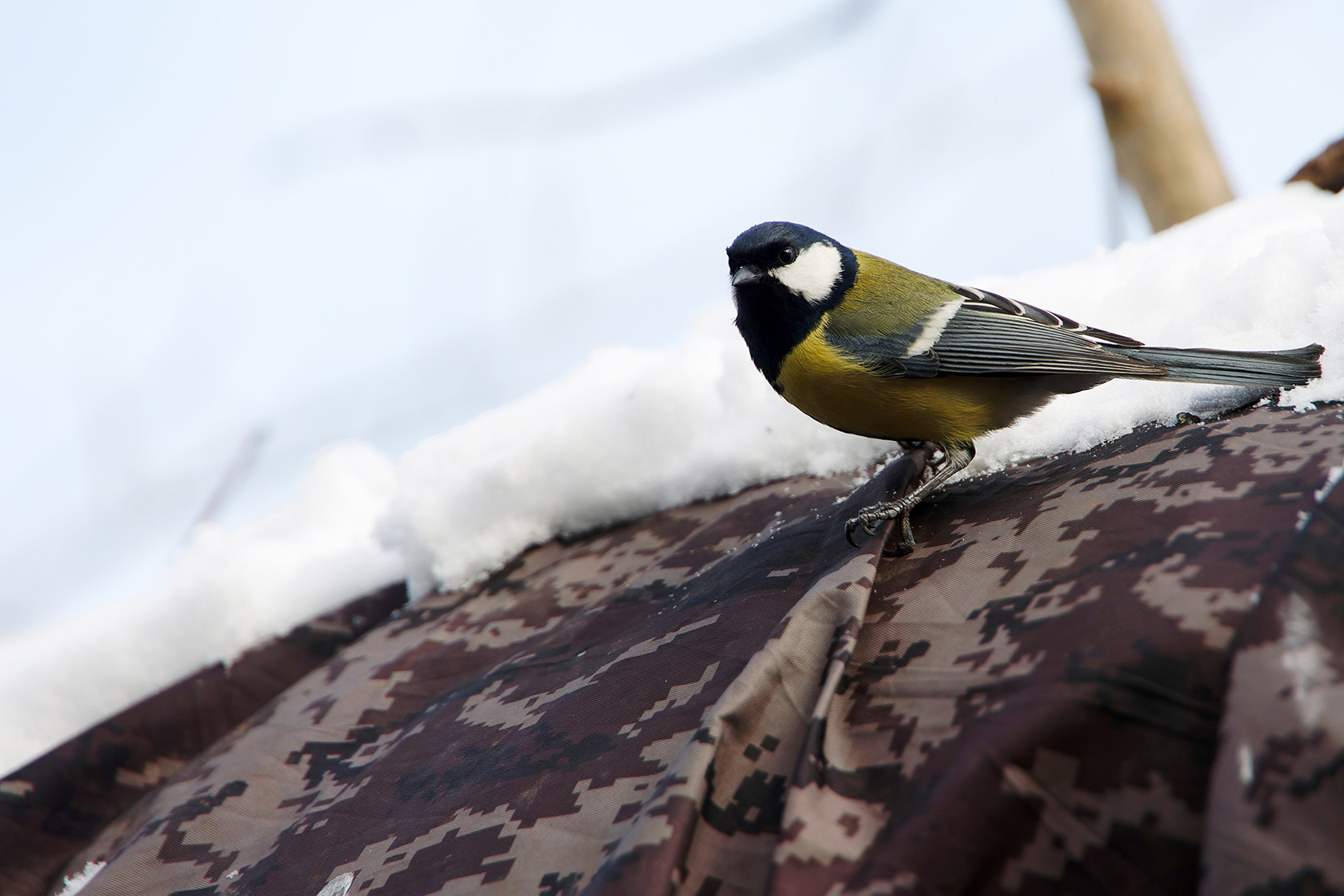
First, the birds perch on sandbags branded with the Nova Poshta logo [the largest Ukrainian courier company – ed.], then they climb down onto the magazine of the assault rifle that rests on the bags, and then they peck the seeds off the floor.
"When I'm on my own here, they even eat from my hand," says Kolia, who is on his shift.
Kuzia isn’t the only one who can sense strangers at the position.
"Whose bird at nine o’clock?" Kolia is being asked on the radio about other, more dangerous "birds".
"Sky covered, sky covered," Kolia replies, meaning "our drones in operation".
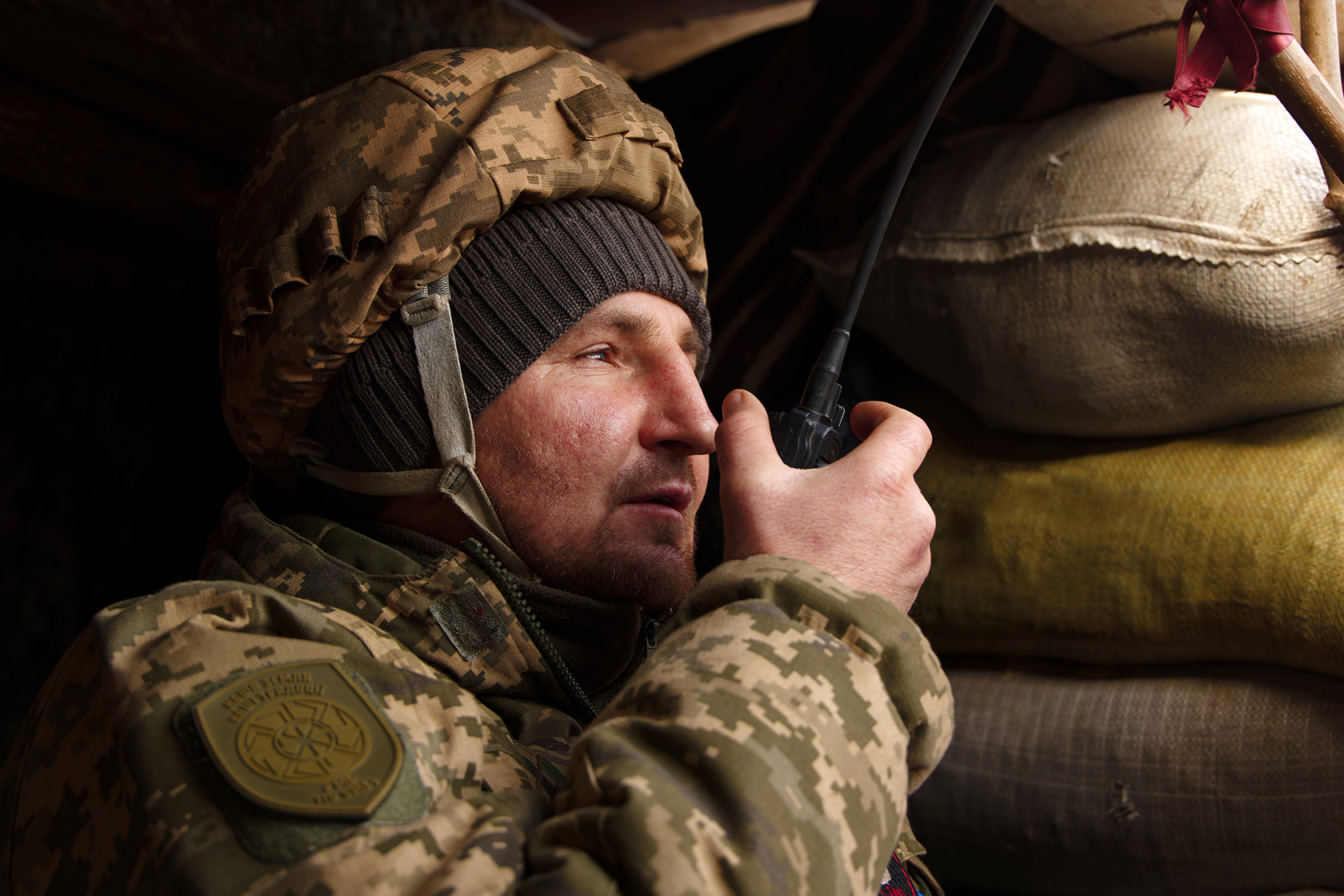
"Ptichky" [‘birds’, meaning drones – ed.] are one of the most frequently observed objects so far, Kolia explains. Recently, his brothers-in-arms managed to knock down an enemy drone worth more than UAH 700,000 [approx. US$18,955 – ed.] and drag it to their positions. Now it is being modified in Kyiv.
Kolia, like several of his brothers-in-arms whom we talked to, came to the war from abroad, where he was working. He saw his 11-year-old daughter in Ivano-Frankivsk Oblast, sent her and his wife off to Poland, and went to the military enlistment office. Before 24 February, he already had some experience in the army, where he learned to run 3-5 kilometres, fire a rifle and throw grenades.
Kolia calls the first three or four months around Avdiivka a waking nightmare: constant enemy offensives, digging trenches, lack of communication. Now he is used to it – between the flybys of Russian drones, the great tits feed from his hand.
Asked whether he plans to go abroad again after the war, Kolia says that he is not thinking about that yet.
"Now we have to kick the enemy out to the end. Those brothers-in-arms who are behind us, it’s very hard to force them to go and replace us, you know? They won't do it."
We’ll be crying
"How do you imagine the end of the war?"
Serhii and Kolia are noticeably confused by this question. During the whole year of the war, they never thought about that. They haven’t even imagined it.
They joke among themselves that they want to liberate at least one settlement – Horlivka, for example – so that when their children and grandchildren ask them "Where did you fight?", they don’t have to answer "in the trenches".
"I want to keep the flag, the uniform," Kolia begins to reflect.
"No, I’m giving the f**king uniform away," Serhii contradicts him.
"What will you show your children then?" Kolia asks.
"Medals, the flag – that’ll be enough," Serhii answers. "I’ll be lying here" – he leans on his hard wooden bed – "and then they’ll say on the radio: ‘That’s it, boys, the war is over! Pack up your shit and go the f**k home!’ I'll even cry, for God’s sake!"
"We’ll be crying!" Kolya agrees with him. "Now I’m imagining us reaching the red star [Moscow – ed.]."
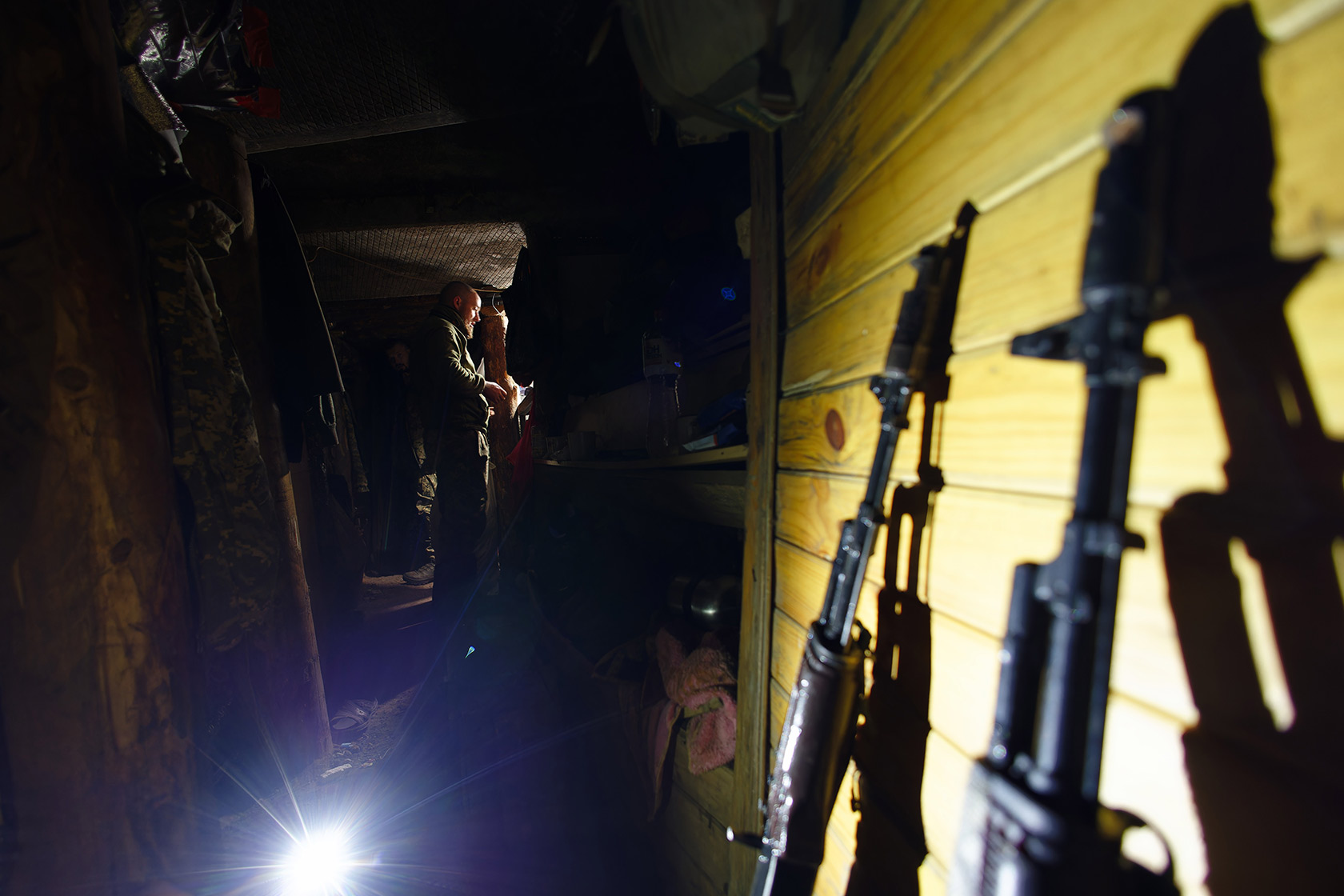
***
Entering Avdiivka, we are met by a burning high-rise building – a shell has hit the 5th and 6th floors, and the flames have spread to nearby rooms. From a distance, it might look as if someone has the lights on too brightly.
But there has been no electricity here for a long time.
A couple of weeks after Ukrainska Pravda’s reporters visited, the Russians intensified their attack on Avdiivka.
Vitalii was killed. Several others were injured, some very seriously.
As one of the servicemen mentioned here told us in a voice message, "We held our positions to the end."
By Olha Kyrylenko, photos by Dmytro Larin, Ukrainska Pravda
Translation: Myroslava Zavadska, Olya Loza, Elina Beketova, Oxana Hart, Theodore Holmes
Editing: Teresa Pearce